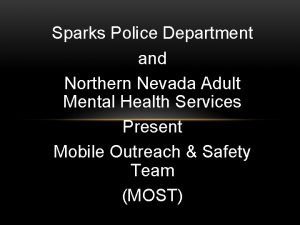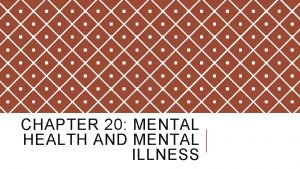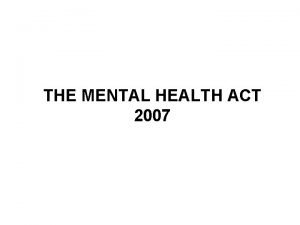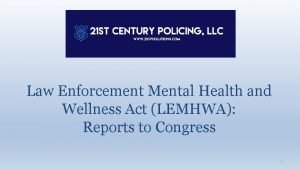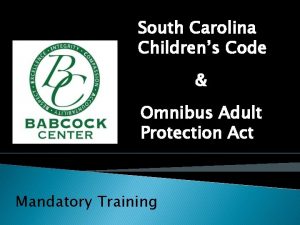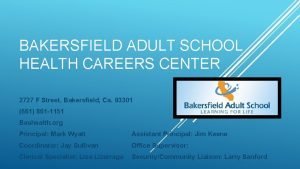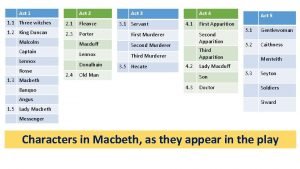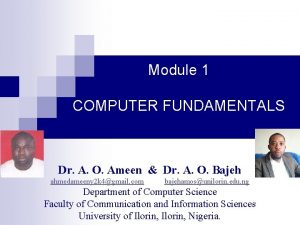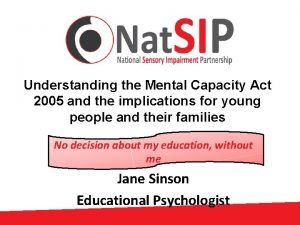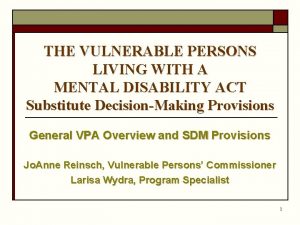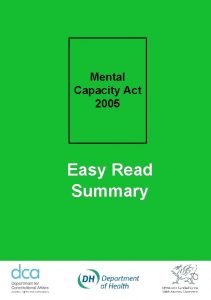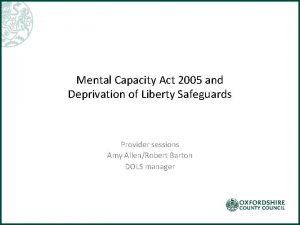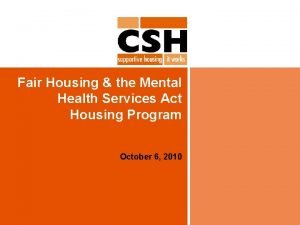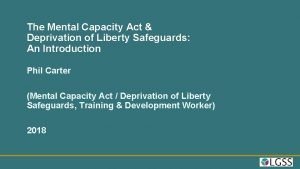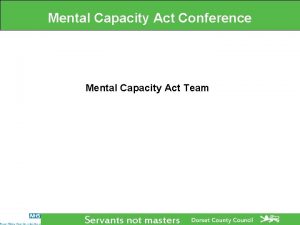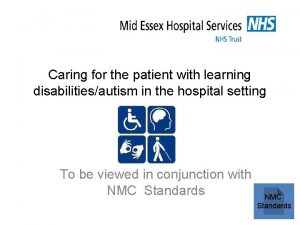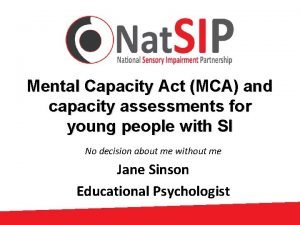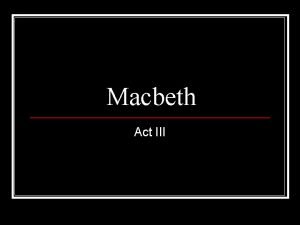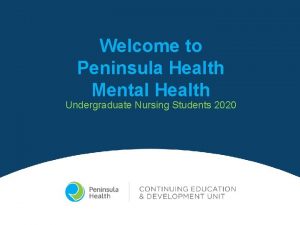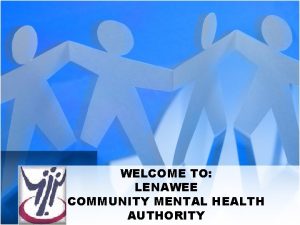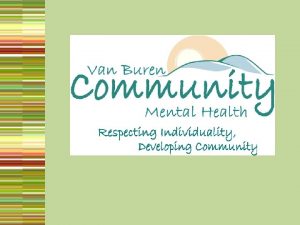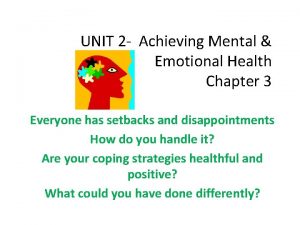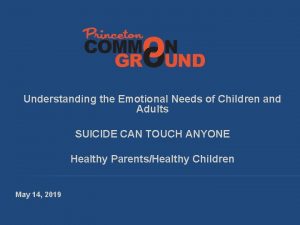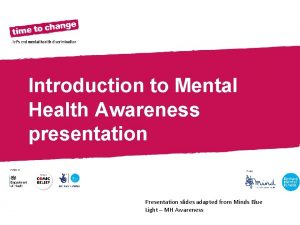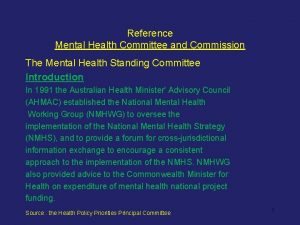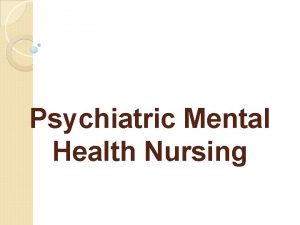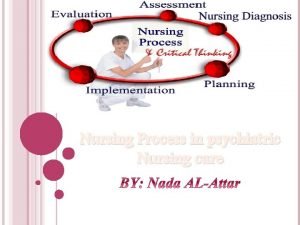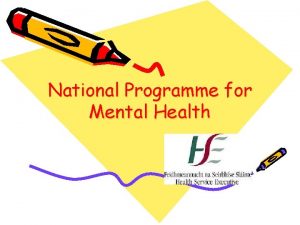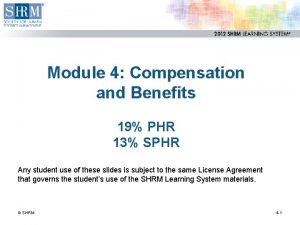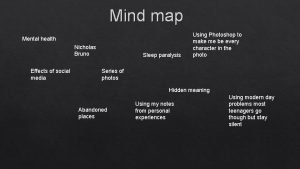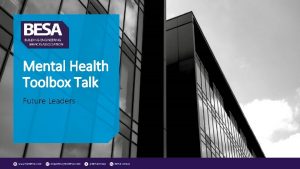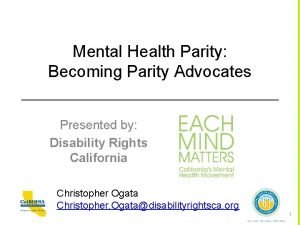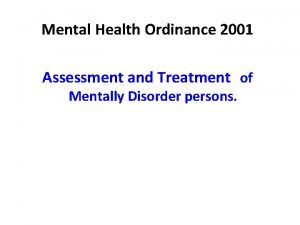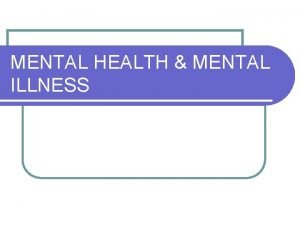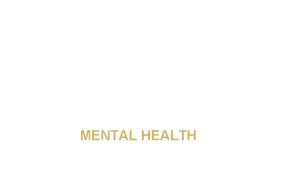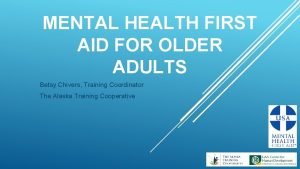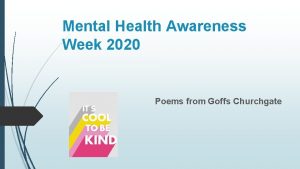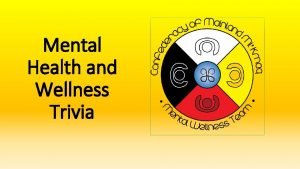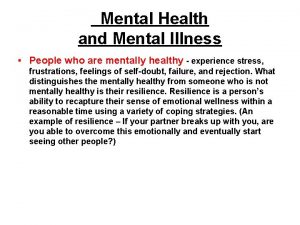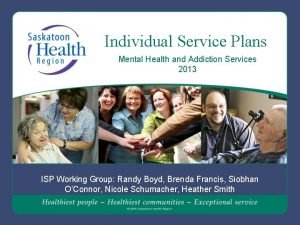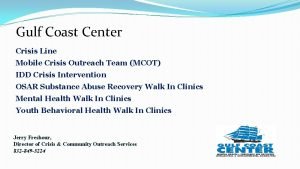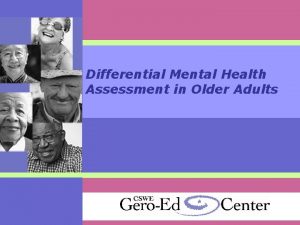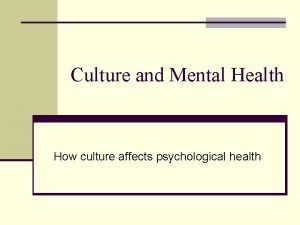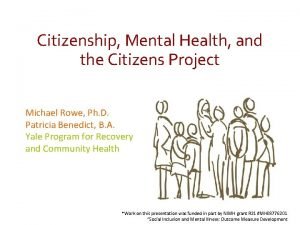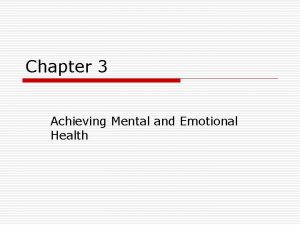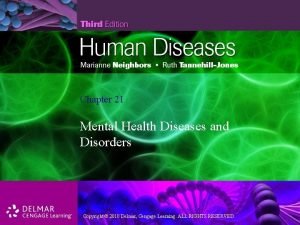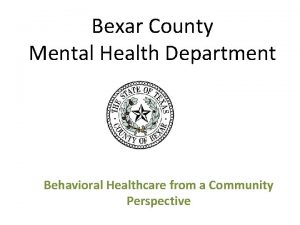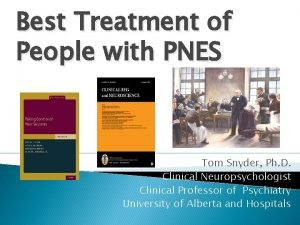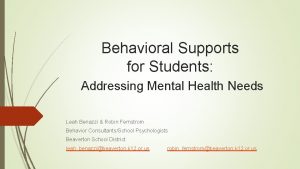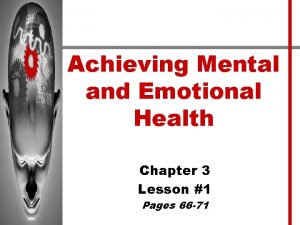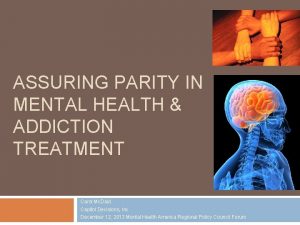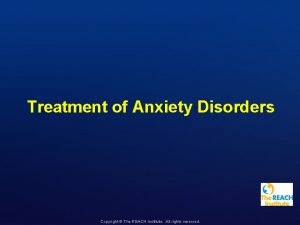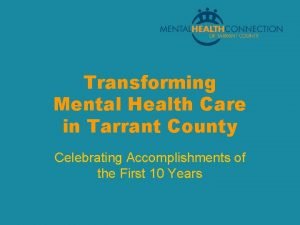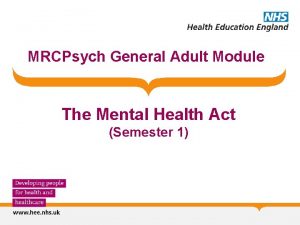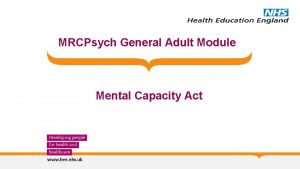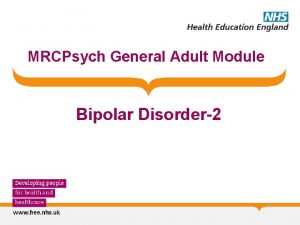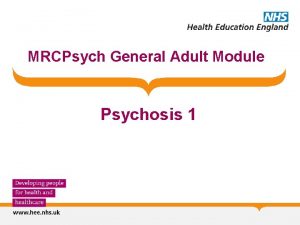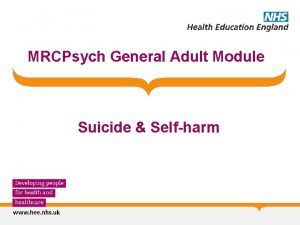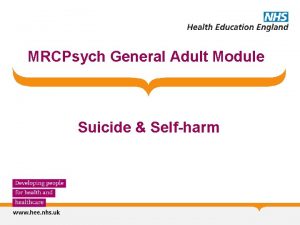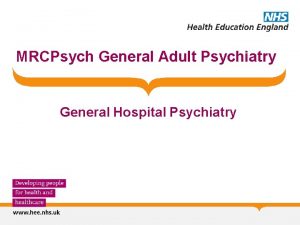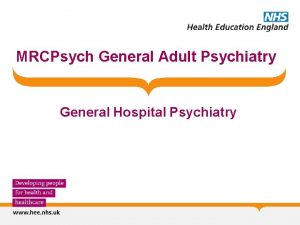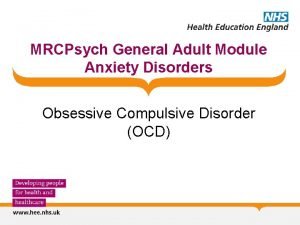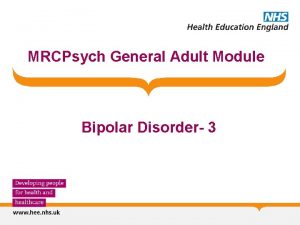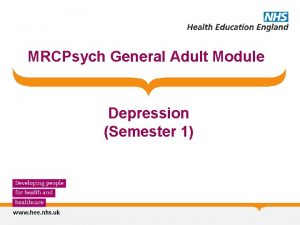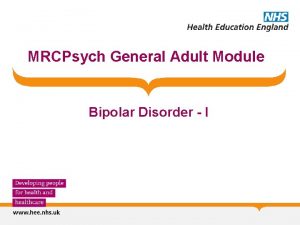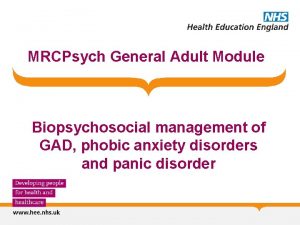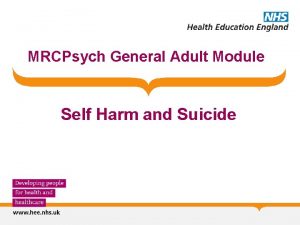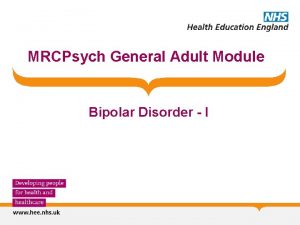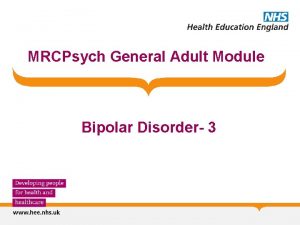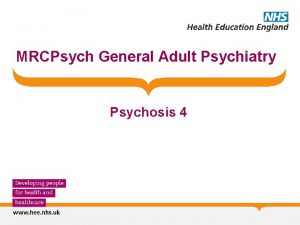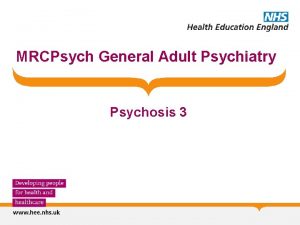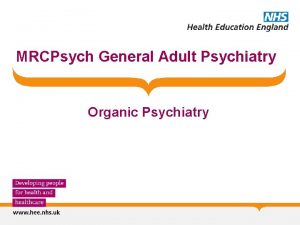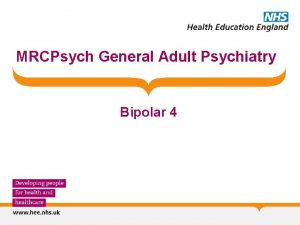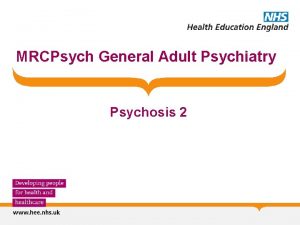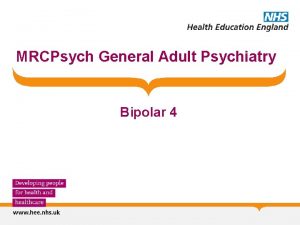MRCPsych General Adult Module The Mental Health Act






























































- Slides: 62

MRCPsych General Adult Module The Mental Health Act (Semester 1)

GA Module: Mental Health Act Aims and Objectives To develop an understanding of the aspects of the Mental Health Act relevant to General Adult Psychiatry In particular: Sections 2, 3, 4, 5(2), 5(4), 136 and SCT

GA Module: Mental Health Act To achieve this • • • Case Presentation Journal Club 555 Presentation Expert-Led Session MCQs • Please sign the register and complete the feedback

GA Module: Depression - 1 Expert Led Session Mental Health Act

The MHA Guiding principles of the MHA: • • • Least restrictive option and maximising independence Empowerment and involvement Respect and dignity Purpose and effectiveness Efficiency and equity

The MHA Terminology Mental disorder • ‘disorder or disability of the mind’ • extremely broad! • exceptions: - if the sole mental disorder is dependency on drugs or alcohol (intoxication or withdrawal though are not excluded) - for S 3 people with LD and no other mental disorder may only be detained ‘if the disability is associated with abnormally aggressive or seriously irresponsible behaviour’

The MHA Terminology For the purpose of the Act, a Learning Disability is: ‘a state of arrested or incomplete development of the mind which includes significant impairment of intelligence and social functioning’

The MHA Terminology • Nature or Degree: “Nature” refers to the particular mental disorder from which the patient suffers, its chronicity, its prognosis and the patient’s previous response to receiving treatment ‘‘Degree” refers to the current manifestation of the patient’s disorder • Both are ‘inevitably bound up’

The MHA Terminology Medical treatment: • Includes ‘nursing, psychological intervention and specialist mental health habilitation (learning new skills), rehabilitation (recover lost skills) and care. ’ • The Act requires appropriate medical treatment to be available to a patient in order to meet the criteria for Section 3 detention or a CTO • This does not have to be the ideal treatment nor does it have to address every aspect of the patient’s condition. • It is available even if refused by the patient. • The ward milieu may be sufficient to qualify for appropriate medical treatment

The MHA Terminology • RMP (Registered Medical Practitioner) – ‘doctors’: need a licence to practice from the GMC (unless acting solely as a medical member of a tribunal) • AC (Approved Clinician): a RMP, nurse, psychologist, OT, SW who has been approved as an AC and thus may be ‘in charge of the treatment of an informal in-patient and so may make a recommendation under S 5(2)

The MHA Terminology • S 12 approved Doctor: a medically qualified doctor who has been recognised under section 12(2) of the MHA as having specific expertise in the diagnosis and treatment of mental disorder.

The MHA Terminology • RC (Responsible Clinician): is the AC with overall responsibility for care of patents being assessed/treated under the MHA. • A patient may only have one RC at any one time but may have more than one AC looking after different aspects of their care at any one time • Nominated Deputy: an RMP or AC who has been nominated by the RMP or AC in charge of an informal patient to act on their behalf with respect to S 5(2)

The MHA Terminology • Nearest relative: defined by a set list; spouse/civil partner>child over 18 (oldest first)>parents (oldest first) etc • SOAD (Second Opinion Appointed Doctor): appointed by CQC to provide a second opinion for medical treatment for a detained patient (or CTO patient)

The MHA Process • RMPs must ‘make a direct personal examination of the patient’ to complete the medical recommendation • If neither RMP has previous knowledge of the patient, it is recommended that both are S 12 approved • No more than 5 days between the two medical recommendations (days of the recommendations aren’t counted) • AMHP has 14 days from the last med rec to make the application (and within 24 hrs for S 4) • Should avoid RMPs and AMHPs with conflicts of interest (eg all in same team etc)

Guide to completing medical recommendations Gold-standard criteria used to test the medical recommendations for detention: • Clear evidence to support the presence of a mental disorder • A statement indicating its nature and / or degree • Why was detention in the interests of patient’s health, safety or the protection of others • Why management in the community was not possible • Why informal admission was not possible

The MHA Structure of the Act • Part 1: brief, describes the purpose of the act • Part 2: compulsory admission to hospital and guardianships (sections related to civil detention and compulsion) • Part 3: court and prison transfers • Part 4: consent to treatment • Part 5: tribunals

The MHA Section 2 - Admission for Assessment: • To be used if extent of nature / degree of condition is unclear • Requires: two RMPs (one S 12 approved and the other with previous acquaintance of the patient or two S 12 approved doctors) and the applicant (AMHP or NR) • Duration: up to 28 days (shorter if discharged by RC, NR, Hospital Managers or Tribunal) • Cannot be renewed!

The MHA Section 2: Grounds: - patient is suffering from a mental disorder of a nature or degree which warrants detention in hospital (for assessment and treatment) - patient ought to be so detained in the interests of their own health or safety of others - Factors to consider: the health / safety of the patient, protection of others, alternatives to detention (informal admission or community management)

The MHA Section 3 - Admission for Treatment • Requires: as above (same as S 2 requirements) & NR must not object to the application • Duration: 6/12 or longer if renewed or patient is AWOL • Discharge possible by RC, NR, Hospital Managers, Tribunal • Grounds: similar as for S 2 and appropriate medical treatment must be available in hospital • S 117 aftercare: pts are entitled to this free of charge until it is decided this is no longer necessary

The MHA Section 4 (admission for assessment in case of emergency) • Requires: 1 RMP, and an applicant (AMHP or NR) • Duration: 72 hours or earlier if discharged by RC • If is converted to S 2 by the completion of the other medical recommendation the 28 days for the S 2 starts at the commencement of the S 4 • Grounds: urgent requirement for detention in which the delay for a S 2 would cause an unacceptable delay

The MHA Section 5(2): • Holding powers used by RMP or AC in charge of the patient or their nominated deputy (e. g. : on call junior doctor) • Duration: 72 hours or as soon as patient has been assessed for detention under S 2 or 3 or is moved from the hospital where they are held • Grounds: the RMP/AC/nominated deputy believes there are grounds for detention under S 2 or 3

The MHA S 5(4) (Nurses’ holding power) • A qualified mental health or LD nurse may detain an informal patient for up to 6 hrs, which gives time for the assessment for S 5(2) to be completed.

The MHA S 7 (Guardianship) • For patients who do not require admission to hospital, but need close supervision and some control in the community as consequence of their mental illness • Requires: same as for S 2; patient must be at least 16 • Grounds: patient suffers from a mental disorder of a nature or degree which warrants this for their own welfare or the protection of others • Authorises: a decision where the patient must live, a requirement to attend medical treatment, work, training or education (although these may then be declined), access to the patient by the RMP, AMHP etc

The MHA • S 135 and 136 (not actually in Part 2 of the Act) • S 135 (Warrant to search for and remove patients) • S 135 subsection 1: allows an AMHP to gain a warrant allowing a police officer to enter premises in order to allow an assessment where ‘there is reasonable cause to suspect that a person believed to be suffering from mental disorder a) has been or is being ill-treated, neglected or kept otherwise than under proper control b) being unable to care for himself’

The MHA • S 135 subsection 2 allows a constable to enter premises to take or retake a person already detained under the MHA to a place of safety • S 136: enables a constable to remove a person found in a public place to a ‘place of safety’ if it is thought that they are suffering ‘from mental disorder and to be in immediate need of care or control’

The MHA S 136: • Duration: 24 hours (extendable by 12 hours by the RMP) or until assessed by an RMP or AMHP • The patient may move from one place of safety to another in this time • Purpose: ‘to permit assessment’

The MHA Transfer between hospitals: • Patients may be transferred if they are detained i. e. : this is allowed therefore by S 4, 2 & 3 but not S 5(2). Detention in general hospital: • There needs to be a RC in that hospital (which could occur via a service level agreement with the local MH hospital) • A general hospital can receive patients on S 17 leave and use S 5(2)

Section 17 leave S 17 leave (leave of absence from hospital): • Leave to detained patients which is granted by the RC • Can be indefinite or for a specific time / occasion • Does not apply to S 5(2), 5(4), 135 and 136 for which leave cannot be granted or to forensic sections e. g. : S 35, 36 and restriction orders etc • If leave is long-term, CTO should be considered • Only RCs can grant leave thus senior trainees cannot • Only the RC can rescind leave, this must be in writing

The MHA S 18 (Returning of patients who are AWOL) • S 18 can be used for cases of: absence from hospital without S 17 leave, CTO recalls and guardianships • S 18 does not apply if: absence is over 6 months or if detention has expired • Patient may be brought back by hospital staff, an AMHP or police (S 135 still required to enter private property) • For S 3, if patient has been absent >28 days, they must be examined by the RC within 7 days to record that ongoing detention is required (section lapses if this is not completed)

Community Treatment orders CTO • To be consider if patient has a history of repeated admissions, failure to follow the care plan, taking into account the patient’s attitude and insight to treatment. • Can only be applied from S 3 (not S 2)

The MHA CTO Conditions: - they make themselves available for examination by the RC or SOAD if they are required to take medication - they make themselves available for examination by RC for renewal of the CTO - Other conditions may be added e. g. : where they live, supervision, medication etc as long as the restrictions do not constitute a deprivation of liberty (see PJ’s case and the Supreme Court decision) - Conditions are necessary to ensure the patient receives treatment, prevent the risk of harm to self / others and is necessary to protect patient's heath and safety

The MHA CTO Recall to hospital: - can only be done by RC - can be considered if conditions are breeched or if patient requires medical treatment in hospital - must be done in writing - patient must immediately return to hospital if handed the recall - will be formally AWOL the next day if placed through letter box or on 2 nd working day if posted 1 st class

The MHA CTO �May be recalled to any hospital �Duration of up to 72 hours �RC cancel the recall at any time �If detained under S 2, CTO continues; under S 3 CTO is cancelled

The MHA CTO Revocation • If the patient requires admission for > 72 hours AND patient meets criteria for detention under a treatment order • Treatment order starts again (i. e. 6/12) • Requires RC and AMHP • Requires ref to Tribunal

Consent to Treatment CTT (Part IV of the MHA) • Includes use of medication, nursing, psychological intervention, specialist mental health rehabilitation and care

The MHA Part IV • S 57: covers neurosurgery for mental disorders and the surgical implantation of hormones to reduce male sex drive • S 58 covers medication (after an initial 3 month period) • S 58 A covers ECT and medication administered for ECT

The MHA Section 58 Capacitous consenting patients: RC certifies the medication categories, max doses and route including ‘prn’ – completes the T 2 form Capacitous refusing or incapacitous patients: • SOAD certification of treatment is required (T 3) • SOAD may amend the treatment plan of the RC • There is no appeal against the SOAD’s treatment plan

The MHA Section 58 A (ECT): • ECT requires capacitous consent or SOAD • Cannot be given if capacitous refusal (except in an emergency under S 62) • SOAD authorisation for ECT required if patient lacks capacity. SOAD consults the written treatment plan, 2 professionals involved in the patient’s treatment (not the RC) and examines the patient. Cannot override advanced directive or objection from court or health and welfare attorney.

The MHA Section 62 • Can override the requirements for S 58 or 58 a • Any RMP or AC who is a nurse prescriber may authorise this • - Urgent means: immediately necessary to save a patient’s life; prevent a serious deterioration (mustn’t be irreversible); to alleviate serious suffering is the minimum intervention to prevent the patient’s behaving violently - being a danger to themselves

The MHA Section 63 • Medical treatment that does not require the patient’s consent • Broad definition of medical treatment (nursing, care, psychological treatment etc) • Medical treatment can be given for the ‘causes or consequences’ of mental disorder being treated under the Act (S 2, 3) • Can also include e. g. medical treatment of a paracetamol OD

The MHA Part IV and CTOs (medication for mental disorder) • CTO patients in the community (after the 1 st month in the community) require Part 4 a certificate signed by RC if patient is capacitous and consenting or SOAD if incapacitous or not consenting • SOAD authorisation required if patient becomes incapacitous (but can continue with the meds if consenting whilst waiting if stopping would cause serious suffering)

The MHA Part IV and CTOs patients on recall: No certificate required if <1/12 since start of CTO, otherwise: - Capacitous and consenting, can be treated with authority of RC - Capacitous and refusing or incapacitous: requires SOAD or S 62 if urgent - Incapacitous can be required to take medications from Part 4 a

The MHA Part IV and CTOs • If a patient's CTO is revoked, so that the patient is once again detained in hospital for treatment, treatment can be given on the basis of a Part 4 A certificate only until a section 58 or section 58 A certificate can be arranged

‘Forensic’ sections Part III – Courts and Prisons May be admitted to hospital under: • Pre-trial orders: S 35, 36 • Post trial orders: 37/41, 38 • Transfer Orders: 47/49, 48/49

The MHA Part III S 35: • Remand to hospital for report on accused's mental condition • Duration 28 days, renewable up to 12 weeks • Requires one 1 RMP to give evidence to the court • Treatment: cannot give medication without consent • Disposal: returns to court (cannot be moved, given leave or discharged)

The MHA Part III S 36: • Remand of accused (un-sentenced) prisoner to hospital for treatment • Requires x 2 RMPs, 1 S 12 approved • Treatment can be given under Part IV • RC cannot move, give leave or discharge • Duration is 28 days and can be extended up to 12/52 • Disposal: return to court

The MHA Part III S 37 (Treatment Order): Like a S 3 imposed after conviction instead of imprisonment Restriction order (S 41) may be imposed by the court and restrict discharge, movement, leave and can only be granted by the MOJ; often a ‘conditional discharge’ will be made

The MHA Part III S 38 (Interim Hospital Order): • Used following conviction and before sentencing, when it is likely but not totally clear that a S 37 will be required • Duration : 12/52 renewable to 12/12 • Disposal: return to court

The MHA Part III S 47 (transfer of a sentenced prisoners to hospital): �Transfer for treatment from prison to hospital of a person who is serving a sentence �Inevitably with a S 49 restriction (restricts discharge, leave) �Prisoner returns to prison S 48 (transfer of an un-sentenced prisoners to hospital): • Temporary transfer from prison for treatment when on remand (can be used only for prisoners in need of urgent treatment for mental illness or severe mental impairment)

The MHA Reference: • A Clinician’s Brief Guide to the Mental Health Act, Tony Zigmond, RCPsych Publications • Mental Health Act Manual, 21 st Edition, Richard Jones • The Maze A Practical Guide to the Mental Health Act 1983 Recommended reading: • Code of Practice

GA Module: The MHA Any Questions? Thank you…. . MCQs next. . .

GA Module: The MHA MCQs 1. To prevent deprivation of liberty occurring: A. There is no requirement to consider what restrictions are placed before entry into a care home B. Involvement of advocacy services should be avoided C. It is vital to consider all aspects of the care plan D. There is no need to involve carers or relatives in planning care E. Talk to the family

GA Module: The MHA MCQs 1. To prevent deprivation of liberty occurring: A. There is no requirement to consider what restrictions are placed before entry into a care home B. Involvement of advocacy services should be avoided C. It is vital to consider all aspects of the care plan D. There is no need to involve carers or relatives in planning care E. Talk to the family

GA Module: The MHA MCQs 2. The deprivation of liberty safeguards: A. Were introduced to prevent deprivation of liberty in a person’s own home B. Facilitate protection of people other than the relevant person from harm C. A primary care trust may be responsible for providing the appropriate standard authorisation D. The supervisory body issues an urgent deprivation of liberty authorisation E. Can be used only in patients with cognitive impairment

GA Module: The MHA MCQs 2. The deprivation of liberty safeguards: A. Were introduced to prevent deprivation of liberty in a person’s own home B. Facilitate protection of people other than the relevant person from harm C. A primary care trust may be responsible for providing the appropriate standard authorisation D. The supervisory body issues an urgent deprivation of liberty authorisation E. Can be used only in patients with cognitive impairment

GA Module: The MHA MCQs 3. The 2007 amendments to the Mental Health Act abolished the following classifications: A. B. C. D. E. Mental illness Psychopathic disorder Mental impairment Severe mental impairment All of the above

GA Module: The MHA MCQs 3. The 2007 amendments to the Mental Health Act abolished the following classifications: A. B. C. D. E. Mental illness Psychopathic disorder Mental impairment Severe mental impairment All of the above

GA Module: The MHA MCQs 4. Under the amended Act, a patient can be detained if the following conditions for treatment are met A. B. C. D. E. Treatment is legal Treatment is offered by a psychiatrist Treatment is available and appropriate Treatment has an effect on risk Treatment will cure the mental disorder

GA Module: The MHA MCQs 4. Under the amended Act, a patient can be detained if the following conditions for treatment are met A. B. C. D. E. Treatment is legal Treatment is offered by a psychiatrist Treatment is available and appropriate Treatment has an effect on risk Treatment will cure the mental disorder

GA Module: The MHA MCQs 5. The provision in the amended Act that helps to uphold the human rights of a patient with personality disorder is: A. B. C. D. E. Ease of discharge Provision of statutory advocacy service Right to refuse treatment if the patient possesses capacity Regular contact with „nearest relative‟ More frequent tribunal hearings

GA Module: The MHA MCQs 5. The provision in the amended Act that helps to uphold the human rights of a patient with personality disorder is: A. B. C. D. E. Ease of discharge Provision of statutory advocacy service Right to refuse treatment if the patient possesses capacity Regular contact with “nearest relative” More frequent tribunal hearings

GA Module: The MHA Any Questions? Thank you.
 Northern nevada adult mental health
Northern nevada adult mental health Mental health and mental illness chapter 20
Mental health and mental illness chapter 20 Mental health jeopardy game
Mental health jeopardy game Mental health act 2007
Mental health act 2007 Lemhwa report to congress
Lemhwa report to congress Omnibus adult protection act
Omnibus adult protection act Bakersfield adult school f street
Bakersfield adult school f street Macbeth act 2 summary
Macbeth act 2 summary C device module module 1
C device module module 1 5 principles of the mental capacity act
5 principles of the mental capacity act The vulnerable persons living with a mental disability act
The vulnerable persons living with a mental disability act Mental capacity act easy read
Mental capacity act easy read Mental capacity act 2005 summary
Mental capacity act 2005 summary Fair housing act mental illness
Fair housing act mental illness 5 principles of mental capacity
5 principles of mental capacity Statutory principles of the mca
Statutory principles of the mca 5 principles of the mental capacity act
5 principles of the mental capacity act 4 stages of mental capacity assessment
4 stages of mental capacity assessment Hecate macbeth
Hecate macbeth Frankston ccu
Frankston ccu Lenawee community mental health authority
Lenawee community mental health authority Van buren county cmh
Van buren county cmh Chapter 3 achieving mental and emotional health answer key
Chapter 3 achieving mental and emotional health answer key Together for mental health
Together for mental health Health triangle social examples
Health triangle social examples Titles for mental health presentations
Titles for mental health presentations Health committee introduction
Health committee introduction Wellness in mind nottingham
Wellness in mind nottingham Psychiatric nursing definition
Psychiatric nursing definition Nursing diagnosis three parts
Nursing diagnosis three parts Mental health programme
Mental health programme Objective of national mental health programme
Objective of national mental health programme Benefits of phr
Benefits of phr Mental health mind map
Mental health mind map Middle tennessee mental health institute
Middle tennessee mental health institute Mental health toolbox talk construction
Mental health toolbox talk construction Mental health documentation training
Mental health documentation training Mental health equity
Mental health equity Mental health ordinance
Mental health ordinance Schizophrenia def
Schizophrenia def Mental health learning objectives
Mental health learning objectives Mental health and older adults
Mental health and older adults Examples of mental health
Examples of mental health Objective for mental health awareness
Objective for mental health awareness Mental health awareness poem
Mental health awareness poem Mental health trivia
Mental health trivia Billy corgan mental health
Billy corgan mental health Mental health america san diego
Mental health america san diego Individual service plan mental health example
Individual service plan mental health example How sport affects health
How sport affects health Mobile crisis outreach team houston
Mobile crisis outreach team houston Mental health and older adults
Mental health and older adults Influence of culture on mental health
Influence of culture on mental health Mental health and citizenship
Mental health and citizenship Chapter 3 achieving mental and emotional health
Chapter 3 achieving mental and emotional health Chapter 21 mental health diseases and disorders
Chapter 21 mental health diseases and disorders Bexar county mental health services
Bexar county mental health services Thomas snyder mental health
Thomas snyder mental health Example of emotional health
Example of emotional health Chapter 3 achieving mental and emotional health answers
Chapter 3 achieving mental and emotional health answers Mental health equity
Mental health equity Reach institute mental health
Reach institute mental health Mental health connection of tarrant county
Mental health connection of tarrant county
